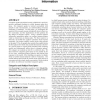327 search results - page 2 / 66 » How to Evaluate Social Intelligence Design |
IVA
2005
Springer
14 years 29 days ago
2005
Springer
Causality is a central issue in many AI applications. Social causality, in contrast to physical causality, seeks to attribute cause and responsibility to social events, and account...
AVI
2006
13 years 8 months ago
2006
The history of the human race is one of increasing intellectual capability. Since the time of our early ancestors, our brains have gotten no bigger; nevertheless, there has been a...
ATAL
2008
Springer
13 years 9 months ago
2008
Springer
Computer agents participate in many collaborative and competitive multiagent domains in which humans make decisions. For computer agents to interact successfully with people in su...
GROUP
2007
ACM
13 years 11 months ago
2007
ACM
To improve existing social bookmarking systems and to design new ones, researchers and practitioners need to understand how to evaluate tagging behavior. In this paper, we analyze...
ITS
2004
Springer
14 years 24 days ago
2004
Springer
Most of the prior descriptions of the important relationships in Intelligent Tutoring System (ITS) projects have focused on the relationships involved in their use in classrooms, ...

